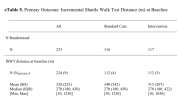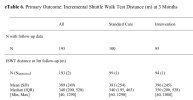ME/CFS Science Blog
Senior Member (Voting Rights)
Now published, see post #9
--------------------------------------------
Abstract
Long COVID, reflected by persistent symptoms, including breathlessness and fatigue, after coronavirus disease-19 (COVID-19) infection, presents an unmet therapeutic need. In this study, the effects of a resistance exercise intervention on exercise capacity and health status in individuals with Long COVID were investigated.
A two-arm randomized, controlled clinical trial including adults with a hospital or community diagnosis of COVID-19 in the preceding 12 months was undertaken. Participants were randomized to usual care or usual care plus a personalized resistance exercise intervention for 12 weeks. The primary outcome was the incremental shuttle walk test undertaken three months after randomization, with secondary outcomes including health-related quality of life (EQ-5D-5L), anxiety and depression (Patient Health Questionnaire) and grip strength. Adverse events and the DePaul Symptom Questionnaire (Short Form) were also assessed.
Between May 2021 and April 2024, 233 individuals (median (interquartile range) 53.6 (43.8, 60.8) years; 146 (62.7%) female, 91 (39.1%) hospitalized with COVID-19) were randomized (n = 117 (50.2%) intervention group, n = 116 (49.8%) control group). The median (interquartile range) percentage adherence with the exercise intervention was 71.0 (47.8, 96.8). The mean (SD) distances achieved in the incremental shuttle walk test at baseline and at follow-up were 328 (225) m and 389 (249) m, in 224 and 193 individuals, respectively. The change in incremental shuttle walk test distance at three months compared to baseline was 83 (118) m in the intervention group (n = 94) and 47 (95) m in the control group (n = 98) (effect estimate (95%) confidence interval 36.4 (6.6, 66.2) m; p = 0.017). By three months, compared to the control group, greater improvements in the intervention group were also observed for the health-related quality of life utility score (EQ-5D-5L) (0.06 (0.01, 0.11); p = 0.020), Patient Health Questionnaire category (0.5 (0.2, 0.8); p = 0.013) and handgrip strength (2.54 (0.89, 4.19) kg; p = 0.003). In 99 individuals who completed the DePaul questionnaire, post-exertional malaise occurred in 40 (83.3%) individuals in the intervention group and 42 (82.4%) individuals in the control group. Five individuals in the control group and 1 individual in the intervention group experienced a serious adverse event (hospitalization) (p = 0.119).
In conclusion, a 12-week program of personalized resistance exercise in a community- and post-hospitalized population with Long COVID improved exercise capacity, health-related quality of life, anxiety and depression, and grip strength. Adherence with exercise was high and post-exercise malaise and adverse events were not increased.
Registration: Clinicaltrials.gov ID NCT04900961
https://www.researchsquare.com/article/rs-6269439/v1
--------------------------------------------
Abstract
Long COVID, reflected by persistent symptoms, including breathlessness and fatigue, after coronavirus disease-19 (COVID-19) infection, presents an unmet therapeutic need. In this study, the effects of a resistance exercise intervention on exercise capacity and health status in individuals with Long COVID were investigated.
A two-arm randomized, controlled clinical trial including adults with a hospital or community diagnosis of COVID-19 in the preceding 12 months was undertaken. Participants were randomized to usual care or usual care plus a personalized resistance exercise intervention for 12 weeks. The primary outcome was the incremental shuttle walk test undertaken three months after randomization, with secondary outcomes including health-related quality of life (EQ-5D-5L), anxiety and depression (Patient Health Questionnaire) and grip strength. Adverse events and the DePaul Symptom Questionnaire (Short Form) were also assessed.
Between May 2021 and April 2024, 233 individuals (median (interquartile range) 53.6 (43.8, 60.8) years; 146 (62.7%) female, 91 (39.1%) hospitalized with COVID-19) were randomized (n = 117 (50.2%) intervention group, n = 116 (49.8%) control group). The median (interquartile range) percentage adherence with the exercise intervention was 71.0 (47.8, 96.8). The mean (SD) distances achieved in the incremental shuttle walk test at baseline and at follow-up were 328 (225) m and 389 (249) m, in 224 and 193 individuals, respectively. The change in incremental shuttle walk test distance at three months compared to baseline was 83 (118) m in the intervention group (n = 94) and 47 (95) m in the control group (n = 98) (effect estimate (95%) confidence interval 36.4 (6.6, 66.2) m; p = 0.017). By three months, compared to the control group, greater improvements in the intervention group were also observed for the health-related quality of life utility score (EQ-5D-5L) (0.06 (0.01, 0.11); p = 0.020), Patient Health Questionnaire category (0.5 (0.2, 0.8); p = 0.013) and handgrip strength (2.54 (0.89, 4.19) kg; p = 0.003). In 99 individuals who completed the DePaul questionnaire, post-exertional malaise occurred in 40 (83.3%) individuals in the intervention group and 42 (82.4%) individuals in the control group. Five individuals in the control group and 1 individual in the intervention group experienced a serious adverse event (hospitalization) (p = 0.119).
In conclusion, a 12-week program of personalized resistance exercise in a community- and post-hospitalized population with Long COVID improved exercise capacity, health-related quality of life, anxiety and depression, and grip strength. Adherence with exercise was high and post-exercise malaise and adverse events were not increased.
Registration: Clinicaltrials.gov ID NCT04900961
https://www.researchsquare.com/article/rs-6269439/v1
Last edited by a moderator:






